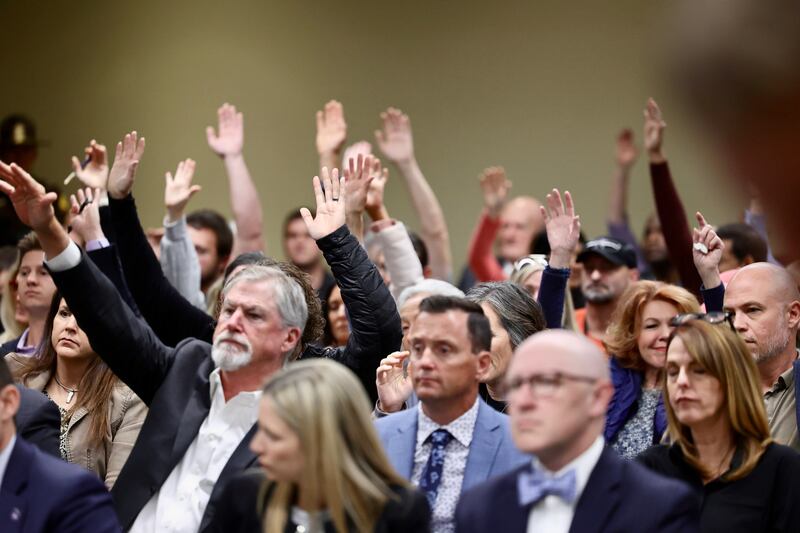Hundreds of unmasked, anti-vaccine mandate Utahns packed into a committee room on Utah’s Capitol Hill early Monday, spilling into five overflow rooms, to tell lawmakers to fight President Joe Biden’s COVID-19 vaccine requirements for large employers.
Their comments ranged from fury over what they called “tyranny” and “federal overreach” to fear they could lose their jobs and their ability to provide for their families. Several, including representatives from business associations, warned the requirements would only aggravate workforce shortages, from hospitals to restaurants.
Misinformation — including unfounded claims that “millions have died” from COVID-19 vaccines — also flew largely unchecked.
“I have until the end of November to be fully vaccinated, prove it or lose my job,” said Christine Lewis, of North Ogden. “If I lose my job, there’s a good chance my husband and I will lose our home.”
Utah lawmakers held the special Business and Labor Interim Committee hearing to discuss and take input on the proposed emergency rule to which Utah Gov. Spencer Cox, legislative leaders and Utah Attorney General Sean Reyes have expressed clear opposition. Reyes is among a group of state attorneys general poised to take legal action when the vaccine rules become official.
Biden’s mandate calls for companies with 100 or more employees to either require their workers to get a COVID-19 vaccine shot, submit to weekly testing or be fired. All federal workers would also be required to get the shot.
The Occupational Safety and Health Administration in coming weeks plans to issue an emergency temporary standard implementing the new requirement, which will cover an estimated 80 million private-sector workers. Businesses that don’t comply could face fines of up to $14,000 per violation.
In Utah, about 3% of employers have more than 100 workers and would be subject to the requirement. About 65% of Utah workers are employed at companies with more than 100 employees, according to state estimates.
To Lewis, Biden’s rule isn’t a fair standard, noting she works remotely and has no contact with customers or other employees. She argued it should be up to individuals to decide whether or not to be vaccinated against the deadly virus or whether to submit to weekly testing.
“We are being forced to provide private information in order to get judged on whether or not we deserve to remain employed,” she said.
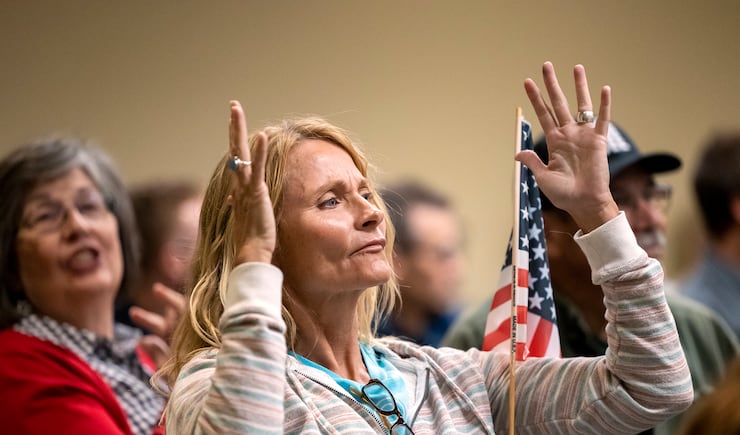
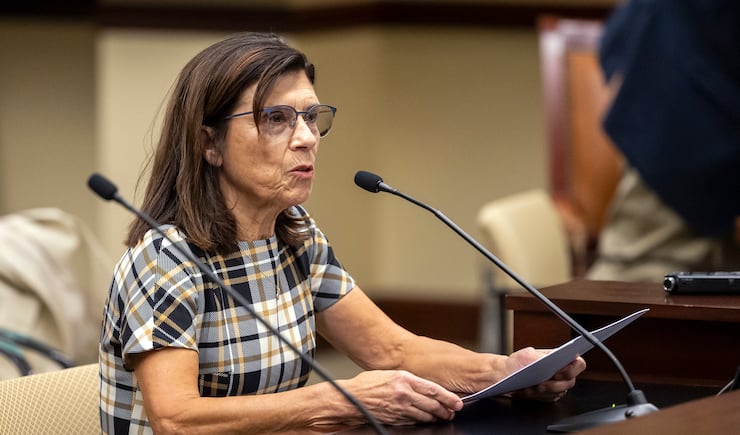
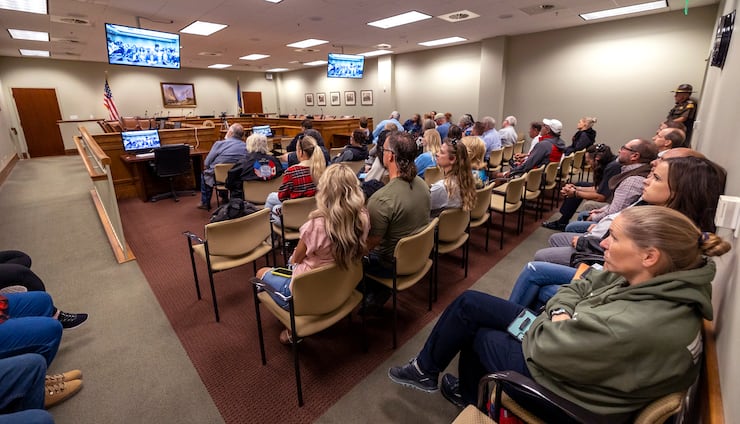
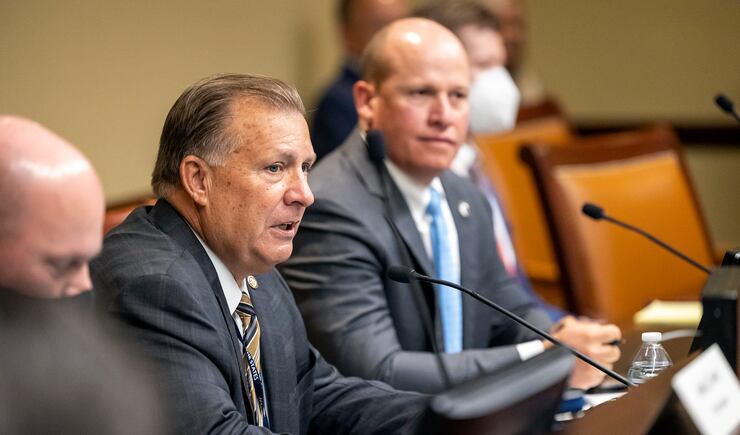
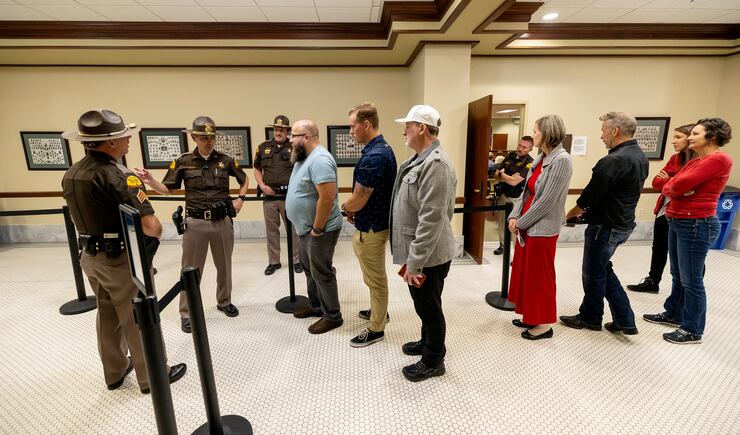
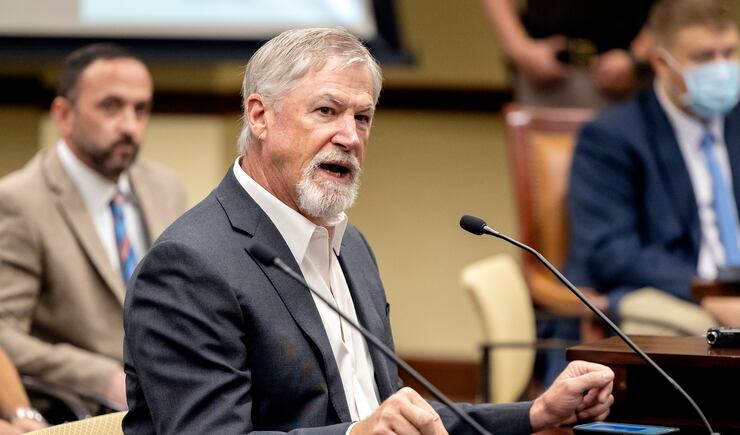
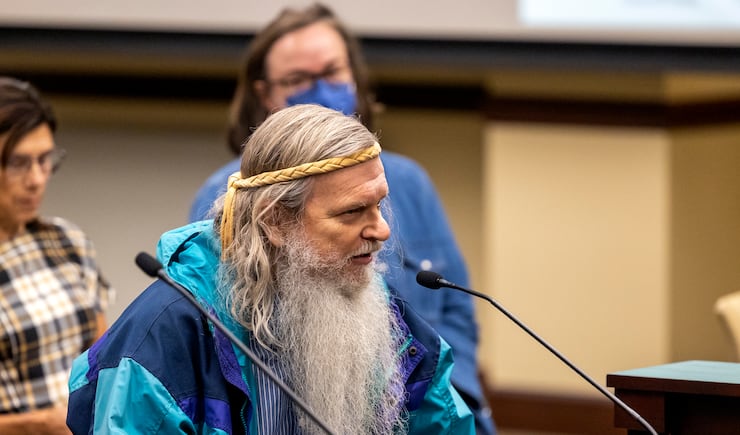
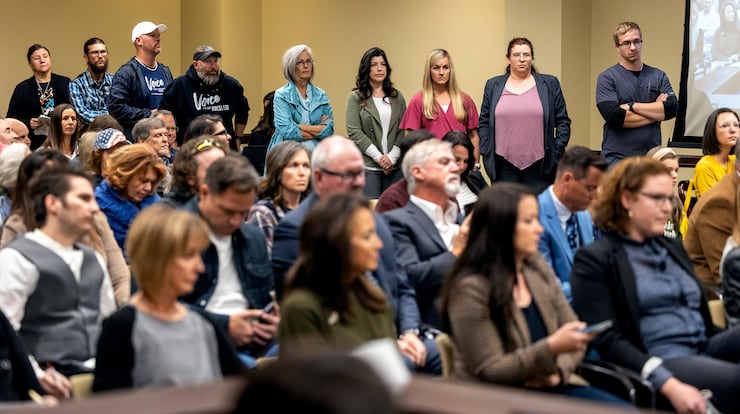
Another woman, Shannon Golladay, said her husband could also lose his job.
“This is about our freedoms,” she said. “It’s not right to force people to do things against their will. Why are we kicking healthy people out of society if they won’t get a shot or a test?”
Almost all of those who attended in person opposed the Biden rule — though hundreds tuned in online, many of whom support the requirements for public safety reasons. Several said they’d wanted to participate in person but decided against it, worried that being in a room packed with maskless people could jeopardize their safety.
Ellen Brady, a doctor based in Salt Lake City, said she was on her way to the hearing when she “literally turned my car around,” reasoning it would be “unsafe” for her to attend.
“It’s clear to me that the president is within his authority to implement these executive orders, and I would strongly urge our legislators to act in the interest of protecting human life,” she said. “Stop fighting those measures known to preserve and protect our citizens.”
Another woman from Salt Lake City, who didn’t provide her name, expressed frustration at calling the employer vaccine requirements a “mandate.”
“This is vaccines or testing,” she said. “If this was, ‘You have to get tested before you come to work,’ wouldn’t you do it? I mean, what are you doing to combat this pandemic?”
To claims that Biden’s rule would lead to workers quitting in droves, recent surveys have found most Americans — 60% — support it.
“We cannot look out at the 700 people who attended this and say that’s an accurate view of what people want,” the woman said.
Utah Solicitor General Melissa Holyoak said Reyes’ office is confident in its legal argument that the requirement is unconstitutional, calling it a “one-size-fits-all rule” that does not take into account people who work at home or remotely.
What Utah’s leaders ultimately do to fight the rule depends on the yet-to-be-issued details of the emergency standard expected from OSHA. Legislative leaders have told the Deseret News they may call an October special session to tackle the issue, depending on those details.
However, lawmakers’ line of questioning in Monday’s hearing indicated the state could rely on Reyes’ lawsuit and possibly a resulting court injunction to push pause on the rule, and they may direct Utah’s labor department not to adopt the rule.
“Say we direct you not to implement the standard,” the committee’s House chairman, Rep. Joel Ferry, R-Brigham City, asked Utah Labor Commissioner Jaceson Maughan. “The ramification is the federal government can come in and take over our OSHA department?”
“That could potentially be the final solution,” Maughan said. “That is a worst case scenario, but it potentially exists.”
Utah’s Occupational Safety and Health Office operates on a combination of federal and state funds.
At the end of the nearly four-hour meeting, Sen. Curt Bramble, R-Provo, the committee’s Senate chairman, said the hearing was planned only to take public input and the committee was not currently considering any legislation. A special session has not been scheduled, either, he said. All that, again, depends on the details of the Biden plan whenever it’s issued from the White House.
Ferry, in an interview with reporters, said the Legislature, which controls the state’s purse strings, said there’s no “defined cost” of a potential lawsuit to fight the rule, but he notes Utah has joined at least 24 other states in the fight “so we’re not alone in this fight. So we’ll see. But I will be supportive of (Reyes).”
‘Unprecedented’ turnout
Bramble said an estimated 700 people attended the hearing, an unheard of turnout. That’s in addition to over 230 who tuned in to the meeting online.
“I don’t believe we’ve ever seen anything like this,” he said.
Rep. Karianne Lisonbee, R-Clearfield, called the meeting “unprecedented,” expressing thanks to those who participated.
At the beginning of the hearing, Bramble asked how many attendees had come to express support for the rule, to which only a couple of hands went up. When he asked how many were there in opposition, practically every hand shot into the air.
Most, if not all, of those who came to protest Biden’s rule were unmasked. Outside of the House Building on the Utah Capitol campus where the hearing was held, several anti-mandate signs lined the sidewalk. Some read, “My body my choice” and “We want freedom to choose!”
During the hearing, some attendees could be seen handing out anti-abortion fliers that read, “Join the Supreme Court Case to overturn Roe!”
Some of those who participated in the meeting online expressed frustration that the hearing gave preference to those who opposed Biden’s rule because it created an environment that would deter supporters from attending.
Bramble, reading comments from some who accused lawmakers of giving preference to either side, said lawmakers’ intent was to “have a fair and balanced hearing for every citizen.”
“We hear you,” Ferry told attendees, thanking them for sharing their opinions, adding that legislators were taking the issue “very seriously.”
“This is a very delicate subject,” he said. “We recognize that it has an impact on everybody’s lives ... We’ll do our best to represent you.”
What will happen with Biden’s vaccine requirements?
Conservatives in Utah and across the nation continue to grapple with Biden’s vaccination plan for employers.
In Utah, legislative leaders have said they’re bracing for a possible special session in October in an attempt to tackle the president’s large employer vaccination requirements, though what a possible Utah legislative solution looks like is unclear.
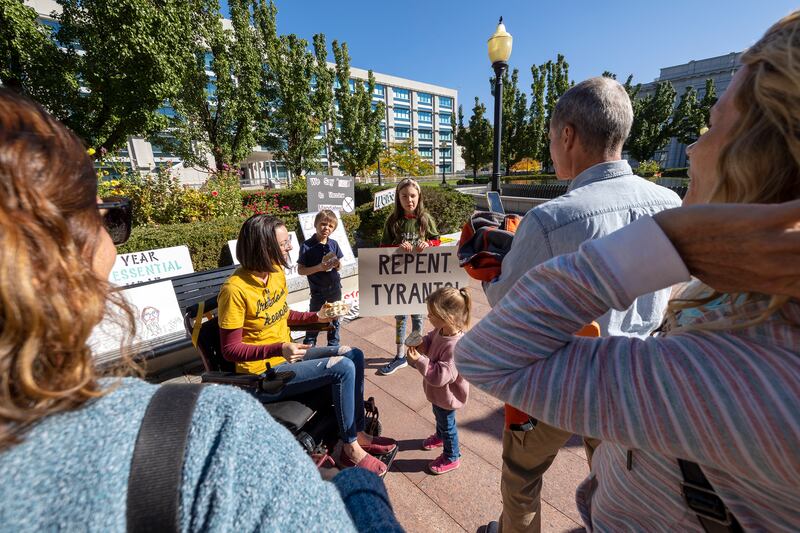
Last month, a vocal group opposed to Biden’s vaccine mandate flooded the Utah Legislature’s Health and Human Services Interim Committee to urge lawmakers to pass legislation protecting businesses from requiring employees to be vaccinated.
Last week, Cox said he supports businesses in their decisions on whether or not to require their employees to get COVID-19 vaccines, but he would not support a bill to ban businesses from requiring them. When asked by a reporter if a bill banning the mandates would be “dead on arrival” at his desk, the governor gave a firm, one-word answer: “Yes.”
It’s not clear, however, whether a Utah lawmaker will indeed run legislation to ban businesses from requiring COVID-19 vaccinations.
Earlier this year, Sen. Mike Kennedy, R-Alpine, sponsored a bill that would have banned private businesses from imposing a COVID-19 vaccine mandate. The legislation, SB208, won approval from the Senate Health and Human Services Committee, passed an initial vote from the full Senate on a 17-11 vote, but never received the final vote it needed to clear the Senate.
Currently, Utah officials are waiting for the details of the Biden rule, which OSHA would issue in the form of an emergency standard, before deciding what to do, though Reyes is poised to sue.
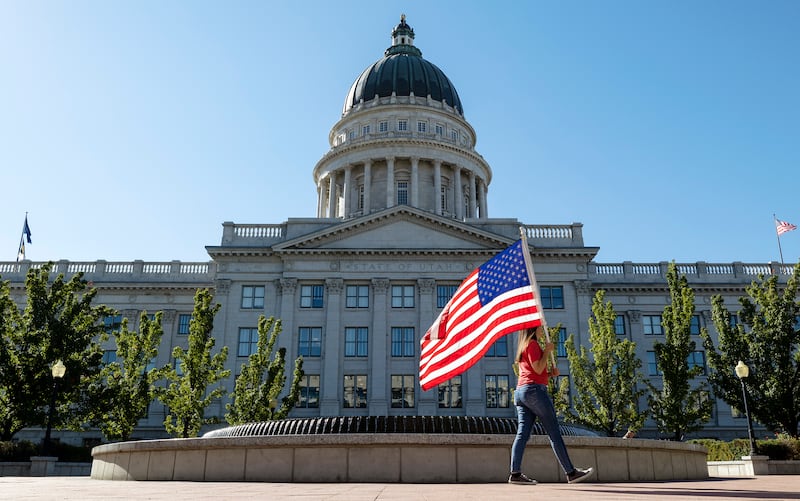
Correction: An earlier version incorrectly stated no hands were raised to show support for Biden’s vaccine employer requirement. It has been corrected to state a couple of hands raised to show support.

